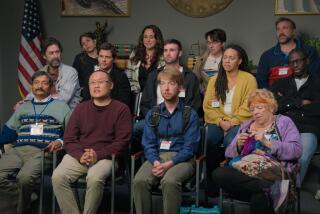Serving on Grand Jury
- Share via
“No person shall be held to answer for a capital, or infamous crime, unless on presentation or indictment of a grand jury. . . .”
These are the first words of the Fifth Amendment to our Constitution. Most people are more familiar with the other parts of the Fifth Amendment which protect us from being tried twice for the same crime, and the part that says we can’t be compelled to be a witness against ourselves. The words are grand but the reality is not.
Our Founding Fathers didn’t trust the courts or prosecutors. They had good reason then, and it seems we have good reasons today. A grand jury that wasn’t beholden to the government was a primary means of protecting citizens from being falsely accused or maliciously prosecuted.
We may have lost part of our Bill of Rights without even knowing it. I’m a federal grand juror and I think we have. As a grand juror, I’m convinced that the courts and the attorneys have made it next to impossible for the jury to do anything but rubber stamp the wishes of the U.S. attorney.
In this district, there are about 20 federal criminal indictments per week. The U.S. attorney’s indictment batting average is 100%. I asked, and they could not remember not getting an indictment.
The jury on which I serve meets once a week. We handle 10 cases a day, with most of the time spent waiting for the attorney to present the next case. Twenty minutes is average per indictment. Why not spend more time seeing more witnesses and asking more questions? Because we’re told that our job is only to evaluate the hearsay evidence of the investigating officer to determine probable cause. Hearsay evidence is permissible in grand jury hearings, but so far in my services, the investigator’s hearsay is the only evidence I’ve heard.
When I asked for additional evidence, the Catch-22 statement is made by the assistant U.S. attorney which goes something like this, “I’ll leave the room to allow the jury to determine if additional evidence is needed.” A second Catch-22 statement is, “The question you’ve asked doesn’t relate to probable cause.”
No, I can’t get 11 other jurors to back me up in my request when the only authority figure in the room is a U.S. attorney, and she or he doesn’t seem to want to honor by request.
My feelings of helplessness and of being used are the reasons for this letter. It’s ironic that the pay is $30 per day, thankfully, not in silver.
H.A. McDONNEL
Fullerton
More to Read
Sign up for Essential California
The most important California stories and recommendations in your inbox every morning.
You may occasionally receive promotional content from the Los Angeles Times.










